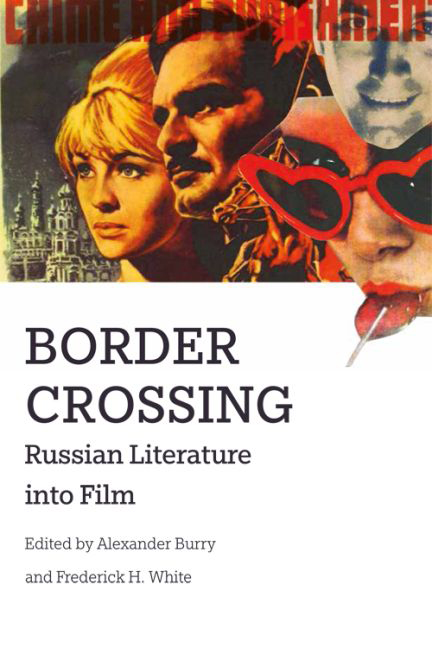Book contents
- Frontmatter
- Contents
- List of Figures
- Notes on the Contributors
- Introduction: Filming Russian Classics—Challenges and Opportunities
- 1 Across the Russian Border
- 2 Dostoevskii's “White Nights”: The Dreamer Goes Abroad
- 3 On Not Showing Dostoevskii's Work: Robert Bresson's Pickpocket
- 4 Stealing the Scene: Crime as Confession in Robert Bresson's Pickpocket
- 5 The Eye-deology of Trauma: Killing Anna Karenina Softly
- 6 “A Vicious Circle”: Karen Shakhnazarov's Ward no. 6
- 7 A Slap in the Face of American Taste: Transporting He Who Gets Slapped to American Audiences
- 8 Against Adaptation? The Strange Case of (Pod) Poruchik Kizhe
- 9 Chasing the Wealth: The Americanization of Il'f and Petrov's The Twelve Chairs
- 10 Fassbinder's Nabokov—From Text to Action: Repressed Homosexuality, Provocative Jewishness, and Anti-German Sentiment
- 11 “The Soviet Abroad (That We Lost)”: The Fate of Vasilii Aksenov's Cult Novel A Starry Ticket on Paper and on Screen
- Conclusion: Passport Control—Departing on a Cinematic Journey
- Bibliography
- Filmography
- Index
Introduction: Filming Russian Classics—Challenges and Opportunities
- Frontmatter
- Contents
- List of Figures
- Notes on the Contributors
- Introduction: Filming Russian Classics—Challenges and Opportunities
- 1 Across the Russian Border
- 2 Dostoevskii's “White Nights”: The Dreamer Goes Abroad
- 3 On Not Showing Dostoevskii's Work: Robert Bresson's Pickpocket
- 4 Stealing the Scene: Crime as Confession in Robert Bresson's Pickpocket
- 5 The Eye-deology of Trauma: Killing Anna Karenina Softly
- 6 “A Vicious Circle”: Karen Shakhnazarov's Ward no. 6
- 7 A Slap in the Face of American Taste: Transporting He Who Gets Slapped to American Audiences
- 8 Against Adaptation? The Strange Case of (Pod) Poruchik Kizhe
- 9 Chasing the Wealth: The Americanization of Il'f and Petrov's The Twelve Chairs
- 10 Fassbinder's Nabokov—From Text to Action: Repressed Homosexuality, Provocative Jewishness, and Anti-German Sentiment
- 11 “The Soviet Abroad (That We Lost)”: The Fate of Vasilii Aksenov's Cult Novel A Starry Ticket on Paper and on Screen
- Conclusion: Passport Control—Departing on a Cinematic Journey
- Bibliography
- Filmography
- Index
Summary
Russian literature has occupied a special position as an object of cinematic adaptation in the hundred-year-plus history of film. The invention and development of the medium closely followed a period of robust literary and cultural achievements rare for any nation. Early in the 1800s, Aleksandr Pushkin, Nikolai Gogol, and Mikhail Lermontov launched the so-called Golden Age of poetry and prose. In the latter part of the century, Ivan Turgenev, Fedor Dostoevskii, and Lev Tolstoi established the international dominance of the Russian novel through compulsively readable narratives that featured bold generic experimentation and a nearly obsessive focus on what the critic Mikhail Mikhailov called the “accursed questions”: the meaning of life, the existence or non-existence of God, and the potential impact of revolutionary transformation of society, among others. Anton Chekhov, toward the end of the century, adapted these concerns to the short story and the play. By the modernist period, beginning after the assassination of Tsar Aleksandr II in 1881, Russian literature was recognized as ascendant in the West and elsewhere, with Turgenev (the most popular Russian writer in Europe, with ties to Gustave Flaubert and the Goncourt Brothers), Dostoevskii, Tolstoi, Chekhov, and other writers translated into all European languages and, in the case of Dostoevskii in particular, attaining cult-like status throughout the continent. The early interest in Russian literature beyond its borders established it as a leading world literature. This international recognition grew in the course of the twentieth century and continues to the present day, as writers such as Mikhail Bulgakov, Boris Pasternak, Vladimir Nabokov, and Viktor Pelevin produced narratives that achieved massive appeal far beyond Russia.
At the same time, nineteenth-century Russian writers brought an unusual degree of contemporaneity to problems of modernity that followed decades after their publication. The 1860s radical movement, both created and praised by writers such as Nikolai Chernyshevskii and critiqued by such figures as Dostoevskii, a half-century later would eventually help inspire the Russian Revolutions of 1905 and 1917 that transformed twentieth-century history and politics.
- Type
- Chapter
- Information
- Border CrossingRussian Literature into Film, pp. 1 - 16Publisher: Edinburgh University PressPrint publication year: 2016



